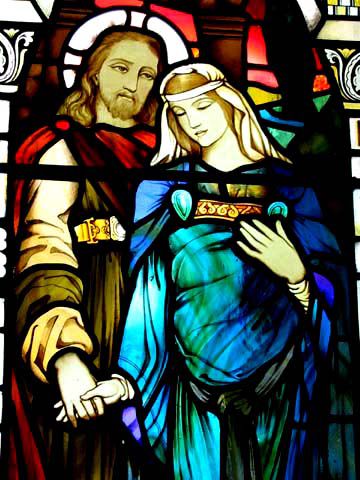July means Mary Magdalene Day is coming!
July 22nd in centuries-old church tradition is considered Magdalene’s birthday and Feast Day. She is the only woman in history about whom Jesus said, “people will tell this story in memory of her”. The story Jesus meant is the story of Magdalene anointing his head and feet as if for burial, but symbolizing the anointing him as messiah. Messiah is a word meaning “anointed one” and she is the only person in the Bible who anoints him. You recall the rest of the story when she weeps and dries his feet with her hair.
In June 2016 the Pope finally declared July 22nd to be Magdalene’s special Feastday again (in the 1960s they had demoted her holiday but people still celebrated it)
Margaret Starbird writes:
The Pope’s recent pronouncement declares Mary Magdalene about equivalent with the Apostles, but we should not be satisfied until she is acknowledged as the Sacred Partner—Bride and Beloved—of Christ. If you have read my “Mary Magdalene, Bride in Exile,” the epilogue expresses my position: “Who do we say she is?” Until Mary Magdalene is proclaimed as the true partner and co-Redemptrix with Christ, my work is not done. It thrills me to know that other, younger women understand this need to balance the masculine energy, stripped of its feminine partner—and are willing to carry on the effort to enlighten others.
 Jesus & Magdalene portrayed as married and pregnant. 19th Century Scottish Church
Jesus & Magdalene portrayed as married and pregnant. 19th Century Scottish Church
The Book of Revelation ends with the Nuptials of the Lamb and his Bride—a union of the Masculine and Feminine—Lord and Lady of our hearts, as in the “marriage window” from the Dervaig Kilmore chapel [pictured right] —a union of archetypes that causes streams of living water to flow from the throne of God– “for the healing of the nations.”
So, in light of the honor that should have been hers for two millennia, proclaiming her feast day “official” is not nearly enough for me! But I love the Pope for taking this small step in the right direction.
I hope you are aware of my two best arguments for Mary as “Bride”: Micah 4:8-11 -The Magdal-eder prophecy which sums up her post-Crucifixion fate in four lines, and the sacred number of the “153 fishes,” a metaphor for the Church as “Bride” in John 21. The gematria of “H Magdalhnh”–153—is also associated with the vesica piscis and goddesses of love and fertility. I consider these two discoveries that prove the the authors of the Gospels acknowledged Mary Magdalene as the consort of Christ as my most important contributions to the Magdalene “unveiling.”
In memory of her—
Margaret
“The Woman with the Alabaster Jar”
www.margaretstarbird.net
Pope Francis Restores Magdalene’s Feast Day
Gabriele shared the following Catholic News Service article with our GoddessChristians forum
Things definitely seem to be moving in the right direction!
~~~~~~~~~~~~~~~~~~~~~~~~~~~~~
http://www.catholicnews.com/services/englishnews/2016/pope-elevates-memorial-of-st-mary-magdalene-to-feast-day.cfm
Pope elevates memorial of St. Mary Magdalene to feast day
By Junno Arocho Esteves Catholic News Service
June 10, 2016
VATICAN CITY (CNS) — Recognizing St. Mary Magdalene’s role as the first to witness Christ’s resurrection and as a “true and authentic evangelizer,” Pope Francis raised the July 22 memorial of St. Mary Magdalene to a feast on the church’s liturgical calendar, the Vatican announced.
A decree formalizing the decision was published by the Congregation for Divine Worship June 10 along with an article explaining its significance.
Both the decree and the article we re titled “Apostolorum Apostola” (“Apostle of the Apostles”).
In the article for the Vatican newspaper, Archbishop Arthur Roche, secretary of the congregation, wrote that in celebrating “an evangelist who proclaims the central joyous message of Easter,” St. Mary Magdalene’s feast day is a call for all Christians to “reflect more deeply on the dignity of women, the new evangelization and the greatness of the mystery of divine mercy.”
“Pope Francis has taken this decision precisely in the context of the Jubilee of Mercy to highlight the relevance of this woman who showed great love for Christ and was much loved by Christ,” Archbishop Roche wrote.
While most liturgical celebrations of individual saints during the year are known formally as memorials, those classified as feasts are reserved for important events in Christian history and for saints of particular significance, such as the Twelve Apostles.
In his apostolic letter “Dies Domini” (“The Lord’s Day”), St. John Paul II explained that the “commemoration of the saints does not obscure the centrality of Christ, but on the contrary extols it, demonstrating as it does the power of the redemption wrought by him.”
Preaching about St. Mary Magdalene, Pope Francis highlighted Christ’s mercy toward a woman who was “exploited and despised by th ose who believed they were righteous,” but she was loved and forgiven by him.
Her tears at Christ’s empty tomb are a reminder that “sometimes in our lives, tears are the lenses we need to see Jesus,” the pope said April 2, 2013, during Mass in his residence, the Domus Sanctae Marthae.
Pope Francis also mentions her specifically in the prayer he composed for the Year of Mercy: “Your loving gaze freed Zacchaeus and Matthew from being enslaved by money; the adulteress and Magdalene from seeking happiness only in created things; made Peter weep after his betrayal, and assured paradise to the repentant thief.”
Archbishop Roche explained that in giving St. Mary Magdalene the honor of being the first person to see the empty tomb and the first to listen to the truth of the resurrection, “Jesus has a special consideration and mercy for this woman, who manifests her love for him, looking for him in the garden with anguish and suffering.”
Drawing a comparison between Eve, who “spread death where there was life,” and St. Mary Magdalene, who “proclaimed life from the tomb, a place of death,” the archbishop said her feast day is a lesson for all Christians to trust in Christ who is “alive and risen.”
“It is right that the liturgical celebration of this woman has the same level of feast given to the celebration of the apostles in the general Roman calendar and highlights the special mission of this woman who is an example and model for every woman in the church.”
Time to allow women to be Ordained Priests?
One of our other members, Klaus M. in Germany posted after hearing the news:

























